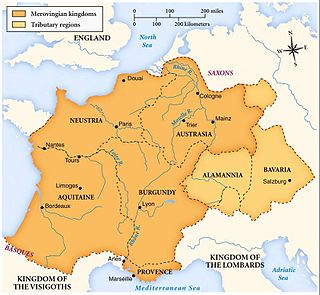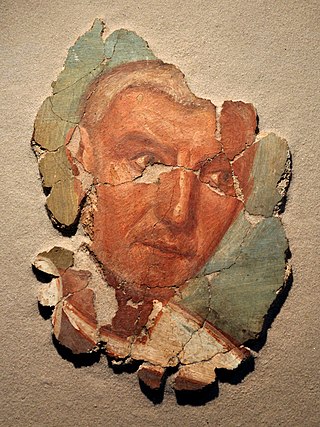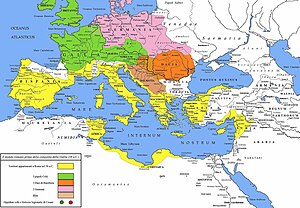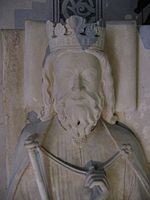
The Merovingian dynasty was the ruling family of the Franks from around the middle of the 5th century until 751. They first appear as "Kings of the Franks" in the Roman army of northern Gaul. By 509 they had united all the Franks and northern Gallo-Romans under their rule. They conquered most of Gaul, defeating the Visigoths (507) and the Burgundians (534), and also extended their rule into Raetia (537). In Germania, the Alemanni, Bavarii and Saxons accepted their lordship. The Merovingian realm was the largest and most powerful of the states of western Europe following the breaking up of the empire of Theodoric the Great.
Reich is a German noun whose meaning is analogous to the English word "realm"; this is not to be confused with the German adjective "reich" which means "rich". The terms Kaiserreich and Königreich are respectively used in German in reference to empires and kingdoms. The Cambridge Advanced Learner's Dictionary indicates that in English usage, the term "the Reich" refers to "Germany during the period of Nazi control from 1933 to 1945".

Gaul was a region of Western Europe first clearly described by the Romans, encompassing present-day France, Belgium, Luxembourg, and parts of Switzerland, the Netherlands, Germany, and Northern Italy. It covered an area of 494,000 km2 (191,000 sq mi). According to Julius Caesar, who took control of the region on behalf of the Roman Republic, Gaul was divided into three parts: Gallia Celtica, Belgica, and Aquitania.

The Gallic Empire or the Gallic Roman Empire are names used in modern historiography for a breakaway part of the Roman Empire that functioned de facto as a separate state from 260 to 274. It originated during the Crisis of the Third Century, when a series of Roman military leaders and aristocrats declared themselves emperors and took control of Gaul and adjacent provinces without attempting to conquer Italy or otherwise seize the central Roman administrative apparatus.
Gallic is an adjective that may describe:

Germania, also called Magna Germania, Germania Libera, or Germanic Barbaricum to distinguish it from the Roman province of the same name, was a historical region in north-central Europe during the Roman era, which was associated by Roman authors with the Germanic people. The region stretched roughly from the Middle and Lower Rhine in the west to the Vistula in the east. It also extended at some point as far south as the Upper and Middle Danube and Pannonia, and to the known parts of southern Scandinavia in the north. Archaeologically, these people correspond roughly to the Roman Iron Age of those regions. While dominated by Germanic people, Magna Germania was also inhabited by a few other Indo-European people.

The Kingdom of the Franks, also known as the Frankish Kingdom, the Frankish Empire or Francia, was the largest post-Roman barbarian kingdom in Western Europe. It was ruled by the Frankish Merovingian and Carolingian dynasties during the Early Middle Ages. Francia was among the last surviving Germanic kingdoms from the Migration Period era.

The Belgae were a large confederation of tribes living in northern Gaul, between the English Channel, the west bank of the Rhine, and the northern bank of the river Seine, from at least the third century BC. They were discussed in depth by Julius Caesar in his account of his wars in Gaul. Some peoples in southern Britain were also called Belgae and had apparently moved from the continent. T. F. O'Rahilly believed that some had moved further west and he equated them with the Fir Bolg in Ireland. The Roman province of Gallia Belgica was named after the continental Belgae. The term continued to be used in the region until the present day and is reflected in the name of the modern country of Belgium.

Gallia Belgica was a province of the Roman Empire located in the north-eastern part of Roman Gaul, in what is today primarily northern France, Belgium, and Luxembourg, along with parts of the Netherlands and Germany.

Frankish, also known as Old Franconian or Old Frankish, was the West Germanic language spoken by the Franks from the 5th to 9th century.
The mythologies in present-day France encompass the mythology of the Gauls, Franks, Normans, Bretons, and other peoples living in France, those ancient stories about divine or heroic beings that these particular cultures believed to be true and that often use supernatural events or characters to explain the nature of the universe and humanity. French myth has been primarily influenced by the myths and legends of the Gauls and the Bretons as they migrated to the French region from modern day England and Ireland. Other smaller influences on the development of French mythology came from the Franks.

Roman Gaul refers to Gaul under provincial rule in the Roman Empire from the 1st century BC to the 5th century AD.

The Franks were a western European people during the Roman Empire and Early Middle Ages. They began as a Germanic people who lived near the Lower Rhine, on the northern continental frontier of the empire. They subsequently expanded their power and influence during the Middle Ages, until much of the population of western Europe, particularly in and near France, were commonly described as Franks, for example in the context of their joint efforts during the Crusades starting in the 11th century. This expansion came about because the romanized Frankish dynasties based within the collapsing Western Roman Empire first became the rulers of the whole region between the rivers Loire and Rhine, and then subsequently imposed power over many other post-Roman kingdoms both inside and outside the old empire.
French is a Romance language that specifically is classified under the Gallo-Romance languages.

Normandy was a province in the North-West of what later became France under the Ancien Régime which lasted until the later part of the 18th century. Initially populated by Celtic tribes in the West and Belgic tribes in the North East, it was conquered in AD 98 by the Romans and integrated into the province of Gallia Lugdunensis by Augustus. In the 4th century, Gratian divided the province into the civitates that constitute the historical borders. After the fall of Rome in the 5th century, the Franks became the dominant ethnic group in the area and built several monasteries. Towards the end of the 9th century, Viking raids devastated the region, prompting the establishment of the Duchy of Normandy in 911. After 150 years of expansion, the borders of Normandy reached relative stability. These old borders roughly correspond to the present borders of Lower Normandy, Upper Normandy and the Channel Islands. Mainland Normandy was integrated into the Kingdom of France in 1204. The region was badly damaged during the Hundred Years War and the Wars of Religion, the Normans having more converts to Protestantism than other peoples of France. In the 20th century, D-Day, the 1944 Allied invasion of Western Europe, started in Normandy. In 1956, mainland Normandy was separated into two regions, Lower Normandy and Upper Normandy, which were reunified in 2016.
The various names used since classical times for the people known today as the Celts are of disparate origins.

Gallo-Roman culture was a consequence of the Romanization of Gauls under the rule of the Roman Empire. It was characterized by the Gaulish adoption or adaptation of Roman culture, language, morals and way of life in a uniquely Gaulish context. The well-studied meld of cultures in Gaul gives historians a model against which to compare and contrast parallel developments of Romanization in other less-studied Roman provinces.

The Gauls were a group of Celtic peoples of mainland Europe in the Iron Age and the Roman period. Their homeland was known as Gaul (Gallia). They spoke Gaulish, a continental Celtic language.
The Germani cisrhenani, or "Left bank Germani", were a group of Germanic peoples who lived west of the Lower Rhine at the time of the Gallic Wars in the mid-1st century BC.

The name of the Franks, alongside the derived names of Francia and Franconia, are derived from the name given to a Germanic tribal confederation which emerged in the 3rd century AD.
















